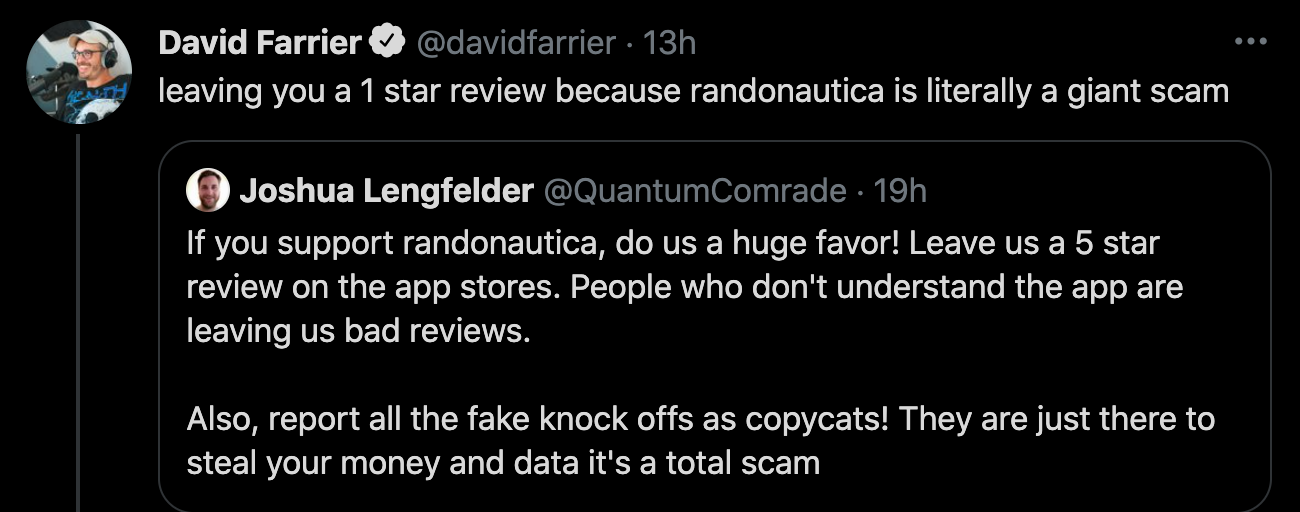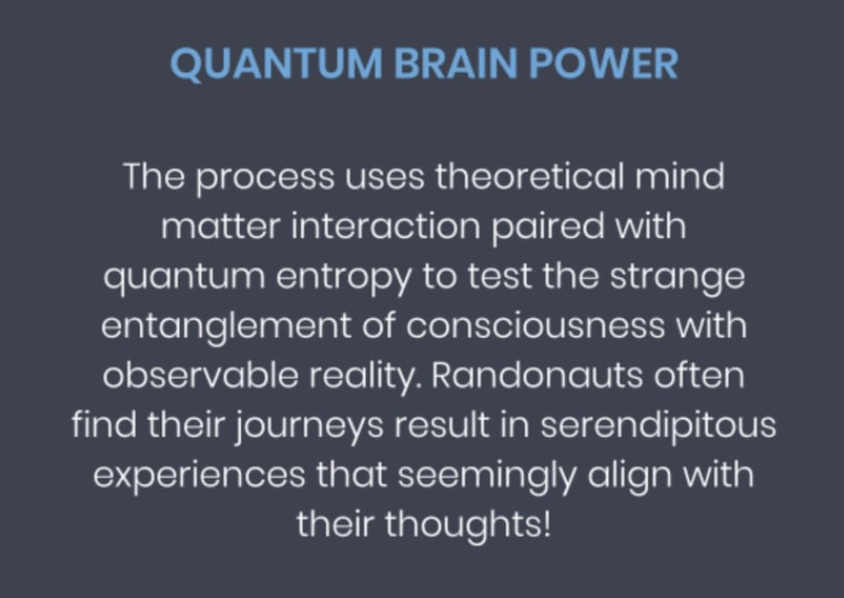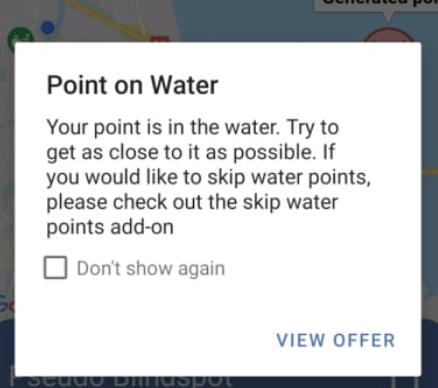The stupidity of Randonautica
“Journalists like you are scum”, the founder of Randonautica tells me

Hi,
Earlier this week I got into a weird Twitter-off with the guy who made Randonautica, an app that’s always annoyed me.
I noticed founder Joshua Lengfelder tweet a request for positive reviews of his app. I replied with a salty “giving you a 1 star review because Randonautica is literally a giant scam”.

Randonautica is an app, a very stupid app, and the idea of the whole thing is that you think really strongly about something like “I want to find my cat” or “I need to find a house to rent” and the app provides you a random location to help guide you on a quest to solve your problem because — get this — the developers think it can tap into your brain.
It’s woo of the highest order. Here is a typical tweet from Lengfelder about it:

Sure, it’s a fun idea: “let’s go for a drive, and take some random turns, and see where we end up!”.
But it’s just glorified geocaching, taking that idea and adding a load of flowery idiocy. So when you download the app, you get a lot of stuff like this:

How do they make money? Well, you need to pay them to make the app more usable, so that the app doesn’t literally just send you into the ocean:

Despite the stupidity of the whole thing, it’s also quite cult like, and the app has found a semi-dedicated following — to the point where the New York Times wrote about it:
Since its release, Randonautica has been downloaded 10.8 million times from the App Store and Google Play, according to the research firm Sensor Tower. After a few months of rapid growth, much of it propelled by TikTok, its downloads have started to taper off, according to data from the analytics firm App Annie.
As the NY Times noted at the end of their piece, the whole thing is woo:
Daniel J. Rogers, a physicist who has worked with quantum random number generators, called Randonautica’s M.M.I. theory “completely absurd.”
“There is no quantum physics here,” said Dr. Rogers, a founder of the Global Disinformation Index. “This is just people using big science words to sound magical. There is no actual science here.”
There’s another aspect I’ve found a little troubling while reading Reddit accounts from those using the App: it plays on magical thinking — sending users into situations that aren’t necessarily all that logical or safe. Because random is not safe:
“8 years ago my dad lost my cat when I was on vacation by not opening the front door for him the whole week I was gone. We lived in the country then, on Lexington Blvd. We never found a body and assumed he found a new home. I downloaded the app today and made my first adventure, with the intent of finding my lost cat. I was directed to a blue house a mile and a half away from my old home, on the same road, Lexington Blvd. I assume this is my new cat’s home. The 2nd intent was to find him, or find where he was found. The app directed me across the road to a field/barn owned by the same people as the first property. I made another attempt to find him somehow. This time I was lead to a random location that meant nothing, but on the way I ended up behind a brand new van that came from one of the first properties. I’m convinced my lost cat found himself new owners just down the road, and that if I knock on that door they either have or know where my lost friend is.”
A user (travelling solo) ends up in a random place knocking on a strangers door, convinced they are going to find their cat.
Other Randonautica stories were hyped on TikTok over the pandemic, as boredom set in and people took to the app:
“When a group of teenagers from Seattle decided to join in on a viral TikTok trend earlier this month, they surely could not have anticipated that their afternoon of fun would lead to their involvement in a police investigation. In a video now viewed over 21 million times, the teens are filmed wandering over a beach, before discovering a suitcase washed up on the rocks. They decide to open the case, and after recoiling from the overpowering smell they reveal to the shaky camera a bin liner containing what is later confirmed to be human remains.”
With stories like this in mind, I was actually keen to write about this last year — and so I’d gotten in touch with a bunch of questions.
They were pretty softball and incredibly kind questions, considering the app was peddling total BS.
Their PR person told me the app’s founder, Joshua Lengfelder, would reply — but he never did.

So yeah, I raised this point with Lengfelder on Twitter this week after his “please give me positive reviews” tweet — and he responded with this, before blocking me:

“The science behind Randonautica?” No, just no. My colleague Dylan Reeve hit Lengfelder up on Twitter, too, asking for any evidence beyond bold claims and insults.
Lengfelder responded:
“Sign an NDA and pay for our companies time, otherwise you’re making baseless accusations you can’t prove.”
Hate to say it, but any baselessness is firmly rooted in Randonautica’s camp. But hey, they’re probably making a load of money — which is what all woo comes back to: exploitation. In this case, promising users a metaphysical experience, where will and GPS co-ordinates combine to solve the world’s problems.
Just make sure you pay, so you don’t end up in the sea.
David.
PS: Thanks heaps for all the feedback on The Gentle Art of Leaving. It seems I am not the only one riddled with anxiety about leaving. There are also about 10,000 new tricks you taught me in the comments about how to best extract yourself from a situation. And I really loved this wisdom from M:
“This kind of exit even has a name here in Germany: “Polnischer Abgang” (or “einen polnischen machen”). In English: “Polish exist/depature/leaving” or “doing a Polish”. It’s when you leave a party without telling anyone.
Why Polish? I’ve search a little bit: despite the name, the origin is not in Poland, but rather dates back to the 4th century in China. General Tan Daoji described that “running away is often the best method”. This is what the retreat without saying goodbye is attributed to.”
“Running away is often the best method”. I really adore this advice — from a General, no less.
PPS: Curious what you think about Randonautica, too. Maybe you’re a giant fan of the app and can come to its defence. But I really am struggling here. The app’s founder didn’t exactly win me over, either.





